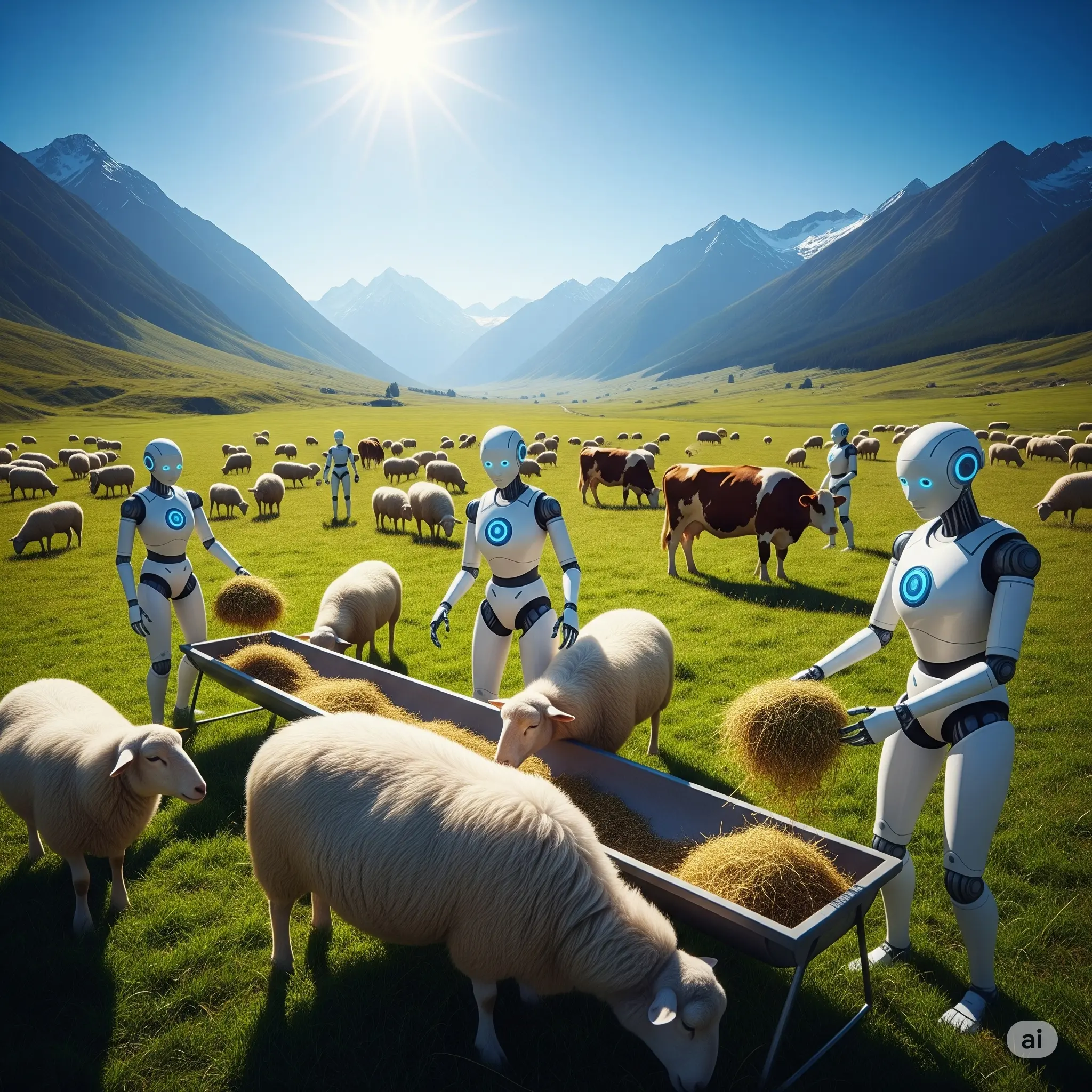The Boom of AI: Prepare for Peak Efficiency
Published on July 4, 2024 • Vojta Baránek

The Boom of AI
Ah, AI. The term practically hums with the electric promise of a better tomorrow. We’re standing at the precipice, apparently, of a technological revolution that won’t just change things; it will fix things. All the inefficiencies, all the bottlenecks, all the inconveniently human elements that slow down the grand machine of progress – AI is here to smooth them out, optimize them away, and deliver us into a future of unprecedented growth and effortless abundance. Or so the pitch goes. It’s a narrative so compelling, so overwhelmingly positive, it requires a certain suspension of cynical disbelief. But let’s, for a moment, try to see what they’re so excited about.
Let’s look at the bright side, as illuminated by the glow of server farms running advanced algorithms.
Enhanced Productivity and Economic Growth
One of the most lauded effects is AI’s potential to dramatically boost productivity. The belief is that by automating complex tasks, optimizing processes, and providing powerful analytical capabilities, AI tools can significantly increase the return on invested capital for businesses. This increased profitability, in turn, is expected to drive more capital deployment across the economy, leading to expanded economic activity and, yes, the creation of jobs. The theory suggests this productivity leap could translate into remarkable GDP growth rates, potentially leading to higher overall income levels and new roles emerging from the dynamism of a more efficient market. From this perspective, businesses powered by AI should see their operational costs shrink relative to their revenue, resulting in higher revenue generated per employee.
Cost Reduction and Increased Abundance (Deflationary Effect)
Beyond growth, there’s the promise of tangible benefits in the form of lower costs. AI’s ability to optimize supply chains, improve manufacturing efficiency, and automate service delivery is expected to exert a significant deflationary pressure on the economy. Imagine the cost of everyday goods and services falling as AI-driven automation reduces labor and resource waste. Proponents suggest this could lead to a future where individuals need to work fewer hours – perhaps less than 30 a week – to maintain or even improve their quality of life, freeing up time for personal pursuits rather than the relentless grind.
New Job Creation and Opportunity
The concern about job displacement is often countered with the historical precedent of technological revolutions creating more jobs than they destroy, albeit different ones. The argument for AI is similar: while some existing roles may change or disappear, the technology’s ability to provide leverage will empower humans to do more and invest more effectively. This shift is seen as having similarities to past transitions, like the move from agricultural to industrial economies, which also fundamentally reshaped the labor market but ultimately led to new types of employment. AI is viewed as a collaborator, opening up new fields and opportunities.
Aging Population Support
The demographic shift towards older populations in many parts of the world presents a significant challenge, both socially and economically. Here, AI is pitched as a vital part of the solution. Automated systems and AI-powered tools could provide assistance and care, helping to manage the burden on younger generations and maintain economic activity through increased efficiency in health care and support services. It’s framed as a way to keep the economy robust even with a changing workforce dynamic.
Global Prosperity and Innovation
On a global scale, AI is viewed by optimists as a powerful engine for economic prosperity and innovation across nation-states. This vision sees the technology fostering competitive development that drives progress benefiting citizens worldwide. However, this future fundamentally trades human effort for raw electrical power. The critical constraint isn’t necessarily talent or capital anymore, but the capacity to generate and distribute truly enormous amounts of energy required to fuel the AI infrastructure. Building new, efficient energy sources becomes paramount.
The Proponents’ Case: The Underlying Claims
Stripped down, the optimistic vision rests on these core assertions:
-
AI provides significant productivity and ROI gains, leading to increased investment and overall job creation.
-
Expect substantial GDP growth, potentially 10% annually, resulting in higher incomes and new job markets.
-
Companies will likely see reduced OPEX as a percentage of revenue and increased revenue per employee.
-
AI’s efficiency drives significant deflation, lowering costs of goods and services, enabling shorter work weeks and improved lifestyles.
-
The revolution creates new jobs and industries, drawing parallels to past transitions like agricultural and industrial revolutions, with AI enabling humans to achieve more.
-
AI tools accelerate learning and entry into technical fields, like coding.
-
The fundamental trade-off is human energy for AI’s electrical energy demands, making energy infrastructure a key requirement.
The Conclusion: Your Single, Practical Piece of Advice
Accepting that this wave of efficiency is indeed coming, the most practical course of action isn’t to lament the passing of the old ways, but to become highly reliable in applying human judgment and purpose to leverage AI as an unparalleled tool. Focus on developing the critical thinking, ethical reasoning, and contextual understanding that AI models currently lack. Use AI to automate, analyze, and accelerate tasks, but bring the uniquely human traits of accountability, empathy, and creative direction. Be the person who isn’t replaced by AI, but rather becomes significantly more capable because of it, grounded in their own inherent reliability and judgment.
Of course, this shining vision of AI-powered prosperity isn’t the only narrative making the rounds. For a rather different perspective on our algorithmic future, you might want to explore The Doom of AI: Why Your Existential Dread Is Probably Justified. Because every utopia needs its dystopian counterpoint, doesn’t it?
Project Feeling More 'Abstract Art' Than Functional App?
If your codebase looks like a Jackson Pollock painting done by a Roomba, it might be time for ProRocketeers. Our developers value verifiable logic over "vibe coding," ensuring your digital masterpiece actually does something other than crash.